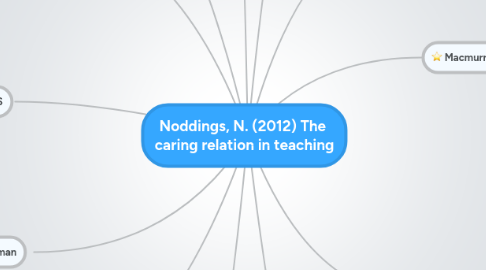
1. Orwell, G. (1949) Nineteen eighty-four
1.1. politics, literature, cultural commentator
1.2. Doublethink - true, negative, political connotation for American education system, ties to
1.3. references Orwell elsewhere:
1.3.1. Aims of Education: happiness cannot be achieved by aiming at it directly
1.3.2. morally destroyed, "Relational Autonomy",
1.3.3. http://greatergood.berkeley.edu/article/item/handle_with_care
1.3.4. Does a child at school go through the same kind of experiences nowadays? Such, such were the joys
1.3.5. http://www.theguardian.com/books/2014/feb/08/george-orwell-such-such-schooldays
2. Mill, J.S. (1993 [1859]) On liberty and Utilitarianism
2.1. philosophy, economics
2.2. self-interest and moral feelings sometimes at odds, happiness main aim, sympathy
2.3. living in community, happiness of others-social contract, understand other perspectives
2.4. Also wrote Subjection of Women
3. Buber, M. (1965) Between man and man
3.1. Philosophy
3.2. thou and I: living in relation: importance of encounter and dialogue: center of education
3.3. Refers to in Caring: A feminine approach to ethics and moral ed
4. Dewey
4.1. Dewey, J. (1916) Democracy and Education
4.2. Dewey, J ( 1963[1938]) Experience and Education
4.3. Thompson, M. (1963) The pragmatic philosophy of C.S. Peirce
4.3.1. Peirce, C.S taught Dewey at Johns Hopkins
4.3.2. Ethics classified higher than science, but conceptual not practical; did believe in primacy of inquiry
4.3.3. Thompson also studied Kant, connections to Peire?
5. Fielding, M. & Moss P. (2011) Radical education and the common school: a democratic alternative
5.1. Moss- Early Childhood, Fielding Education/ University College London
6. Empathy and relation
6.1. Ickes, W. (1997) Empathetic Accuracy
6.1.1. Psychology UT Arlington
6.1.2. Judgments about thoughts and feelings are generally more accurate when people have relationships with, rapport with, knowledge of and interest in another person.
6.1.3. Beyond emotional matching
6.2. Steuber, K. (2006) Rediscovering empathy
6.2.1. Philosophy/ College of the Holy Cross
6.2.2. Reenactive emapthy requires a cognitive component to go beyond trying to identify how a person feels to understanding why they feel that way
6.2.3. Basic empathy is egocentric simulation
7. Weil, S
7.1. philosophy/politics 1977? Reader?
7.2. method of attention, including references to education, but holistic - relevant to all areas
8. Wilson, E.O. (2006) The creation : an appeal to save life on earth
8.1. Sociobiology - humans have an essential biological nature, but they adapt to their environment, how have moral norms evolves, what is the right society/correct action based on that nature
8.2. written as a letter to a Baptist minister - appeal to act on innate human values to protect/heal the environment - asking the big 'interdisciplinary' philosophical questions
8.3. entomology and evolution/ harvard
8.4. multiple references in Noddings' works
9. Macmurray, J.(1964) Teachers and Pupils
9.1. asked many of the same questions Noddings asks about what we need to live goood lives, what we should learn, the importance of living in relations- inc. education of the emotions
9.2. Interesting - friendship as liberty and equality
10. Sunstein, C.R. (2009) Going to extremes: How like minds unite and divide us
10.1. groups of like-minded people tend to move the group towards extremism
10.2. relation to caring and dialogue clear, critical attitudes vital w/caring, especially because of those near to us possibly resulting in more homogeneous groups - still thinking on this one
11. Empathy as affective vs. cognitive within care ethics
11.1. Hoffman, M. (2000) Empathy and moral development: implications for caring and justice
11.1.1. Psychology/NYU
11.1.2. empathetic/sympathetic distress, developmental levels
11.1.3. children construct "emotionally charged moral principles" based on socialization (p.18)
11.2. Slote, M. (2007) The ethics of care and empathy
11.2.1. Philosophy/U of Miami
11.2.2. Building from Noddings and Gilligan, says empathetic caring is a moral criterion - sentimentalist
11.2.3. empathy as affective response, cited Hoffman
12. Care Ethics
12.1. Her own work
12.1.1. Noddings, N. (1984) Caring: A feminine approach to ethics and moral education
12.1.2. Noddings, N. (1992) The challenge to care in schools
12.1.3. Noddings, N. (2007) Caring as relation and virtue in teaching
12.1.3.1. Walker, R. (Ed.)
12.1.3.1.1. UNC/Philosophy
12.1.3.2. Ivanhoe, P.J. (Ed.)
12.1.3.2.1. U of Hong Kong/Philosophy
12.1.4. Noddings, N. (2010) The maternal factor: two paths to morality
12.2. Others' Work
12.2.1. Gilligan, C.J. (1982) In a different voice
12.2.1.1. psychology/feminism, NYU
12.2.2. Held, V. (2006) The ethics of care: personal, political, global
12.2.2.1. philosophy/feminism, CUNY Graduate Center

